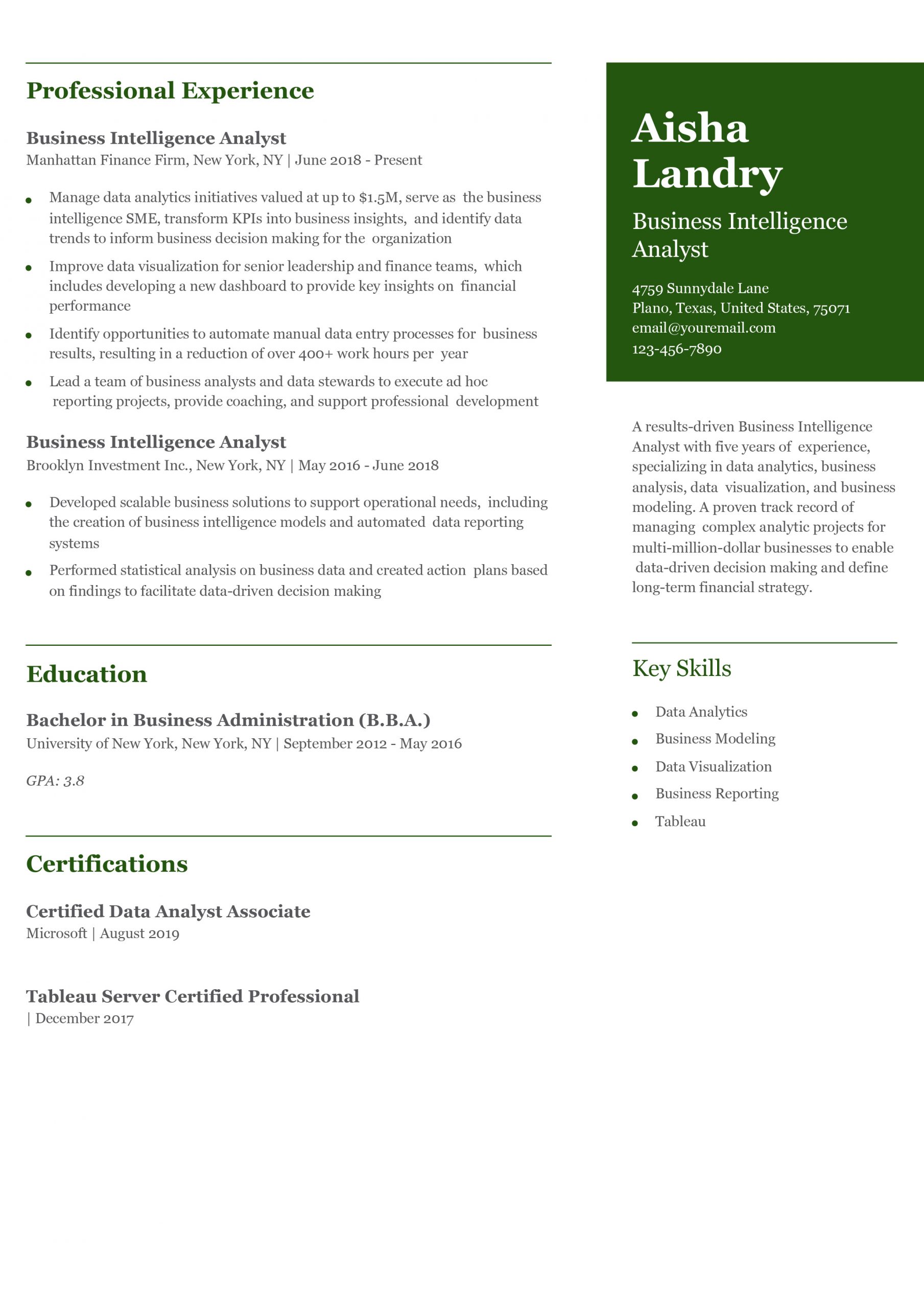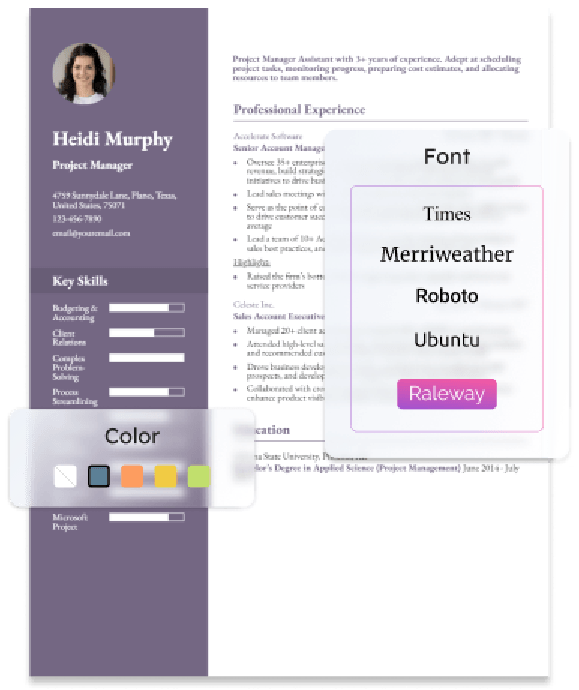To write a business intelligence (BI) analyst resume, you must create an accomplishment-driven document highlighting your ability to leverage data analytics and create impactful business strategies. Emphasize your background in analyzing complex data sets to uncover opportunities, identify risks, and generate value for your organizations. This guide will help you translate your experience into a powerful BI analyst resume.
Most Popular Business Intelligence Analyst Resumes
Entry-Level Business Intelligence Analyst Resume Example
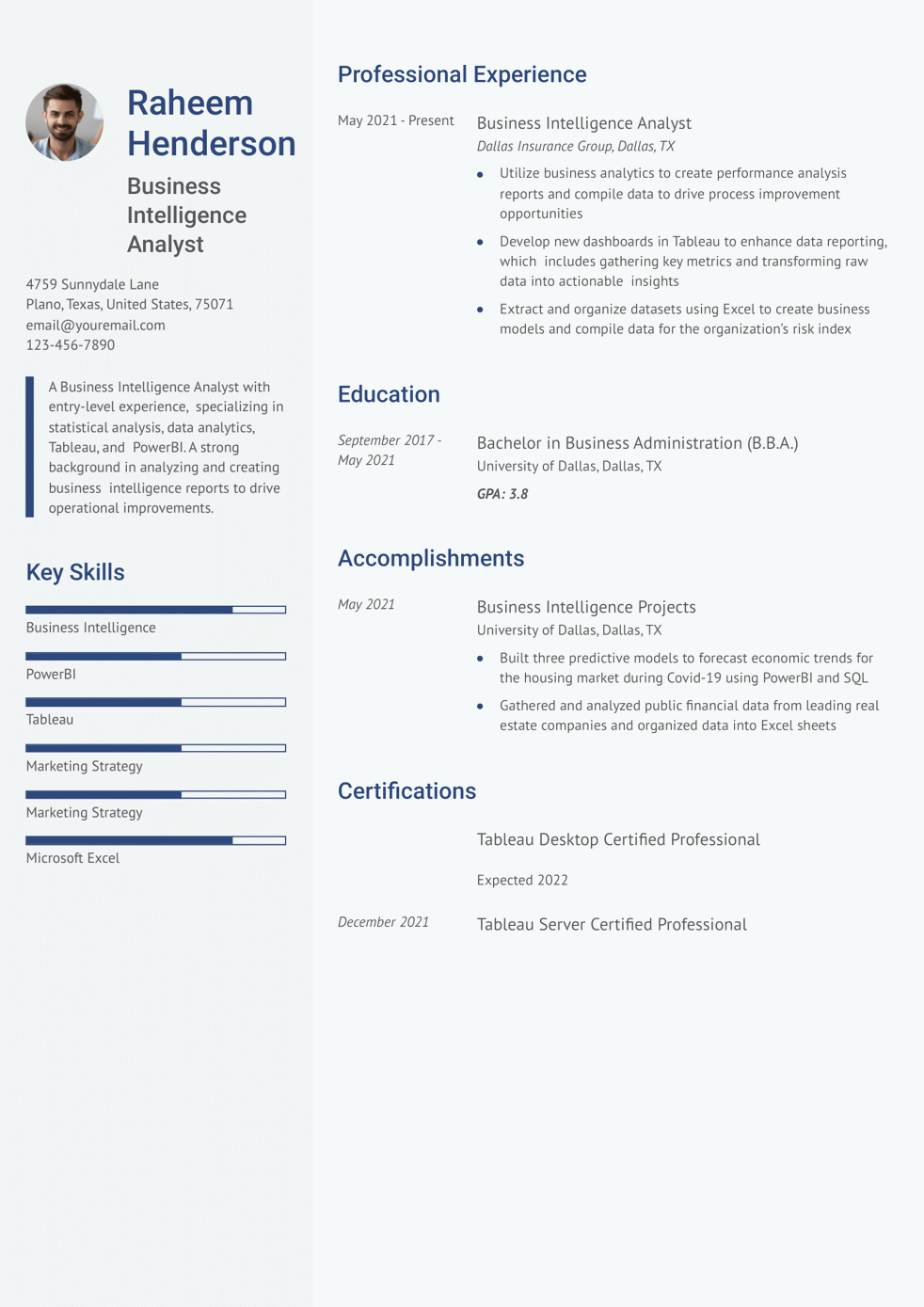
Why this Business Intelligence Analyst resume example is strong:
Raheem’s resume highlights key technical skills such as Tableau, PowerBI, and Excel, which are essential in the BI field. His experience working on predictive models and improving data reporting shows a commitment to data-driven decision-making. Learn more about how to make a resume here.
Experienced Business Intelligence Analyst Resume Example
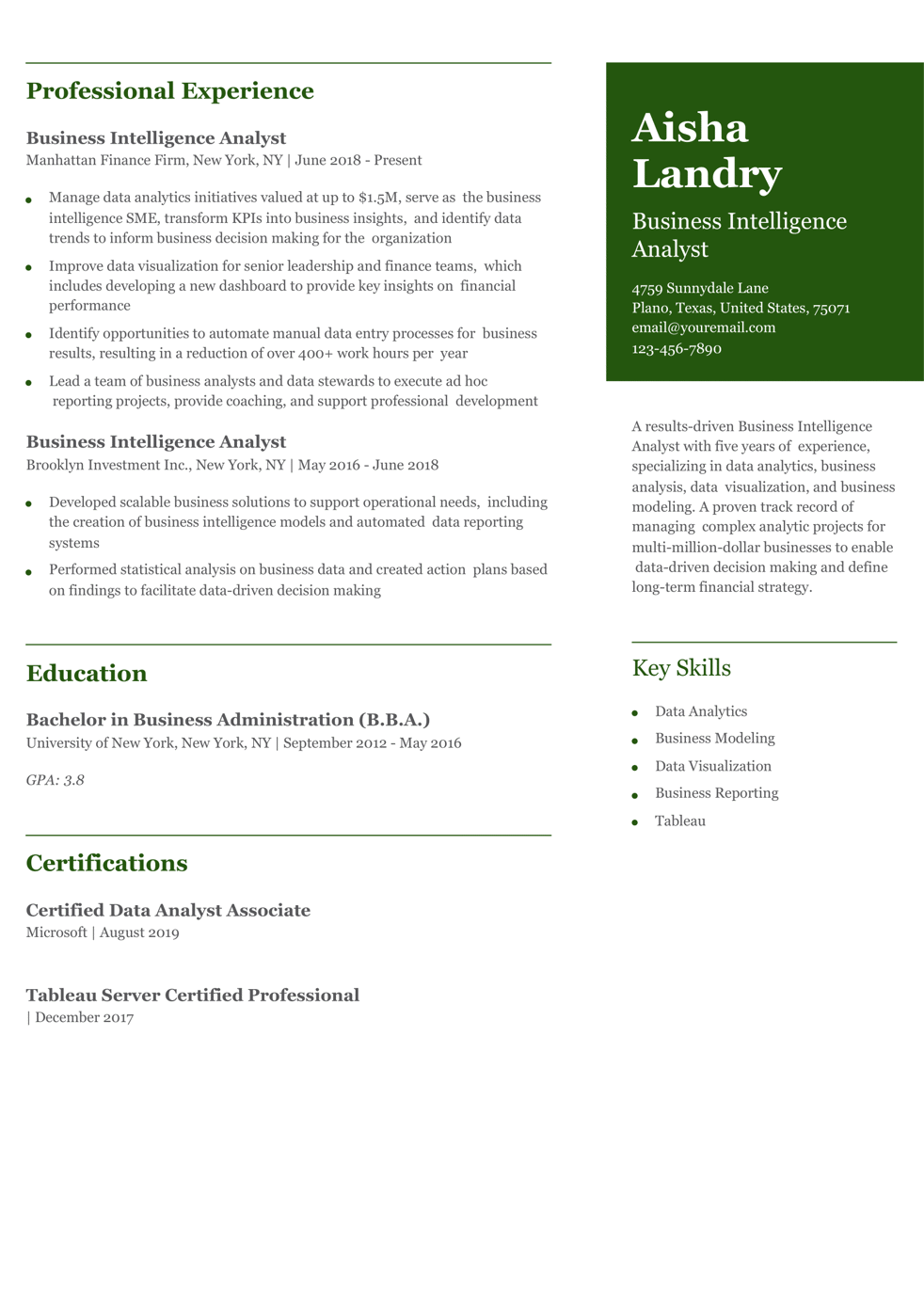
Why this Business Intelligence Analyst resume example is strong:
Aisha’s resume demonstrates leadership, technical expertise in data visualization, and process optimization. Her ability to reduce manual hours and improve data insights is a key strength for a senior-level BI analyst role. Explore the best resume formats here.
Senior Business Intelligence Analyst Resume Example
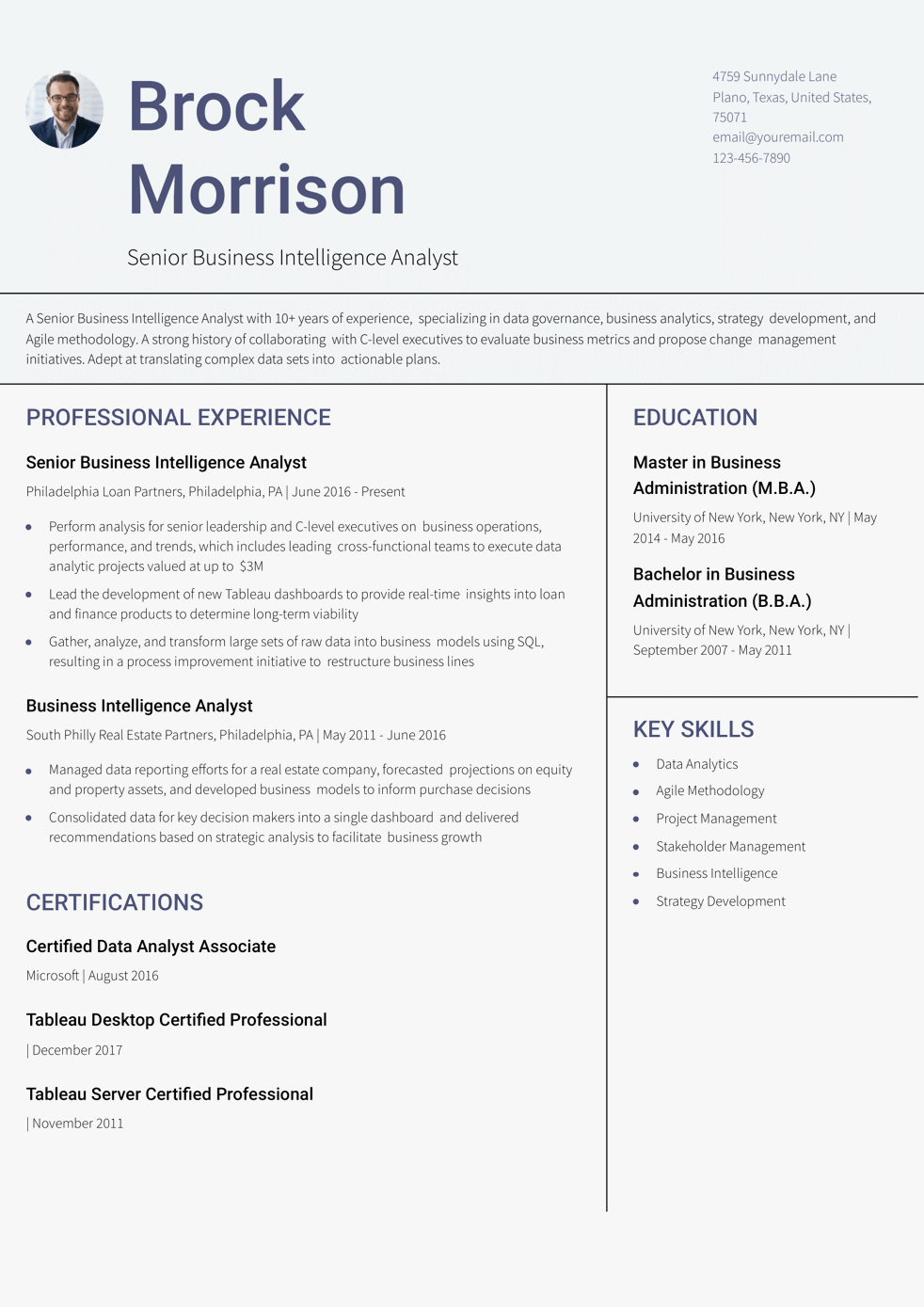
Why this Business Intelligence Analyst resume example is strong:
Brock’s experience in senior roles, along with his leadership in managing large-scale projects, positions him as a strong candidate for top-level BI analyst positions. His ability to drive strategic change based on data insights is essential for leadership roles. Learn more about how to list your education on a resume here.
Junior Business Intelligence Analyst Resume Example
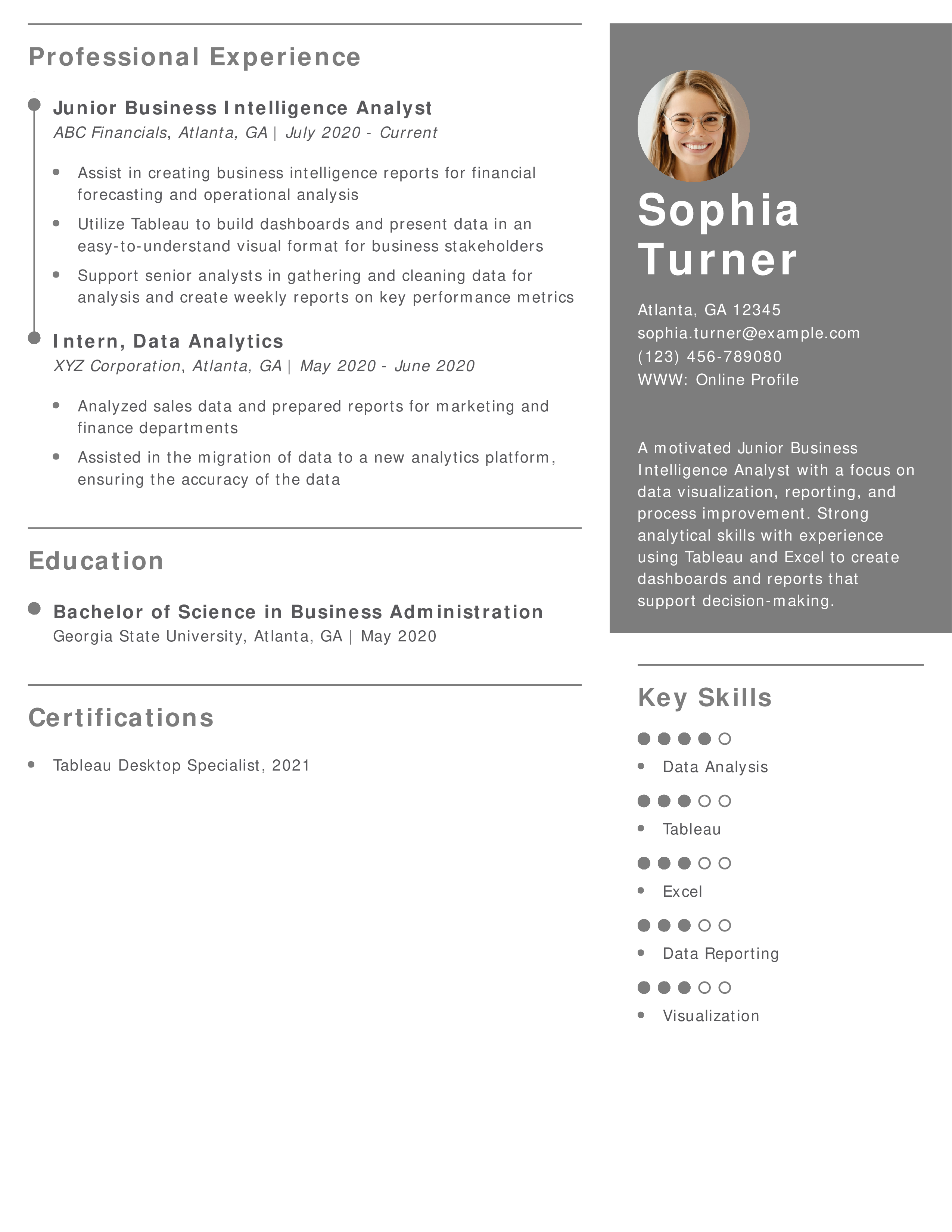
Why this Business Intelligence Analyst resume example is strong:
Sophia’s resume is an excellent example for junior-level candidates, showcasing key technical skills such as Tableau and Excel, along with internship experience. Her ability to assist in report generation and data analysis highlights her potential for growth. Check out resume tips here.
Data-driven Business Intelligence Analyst Resume Example
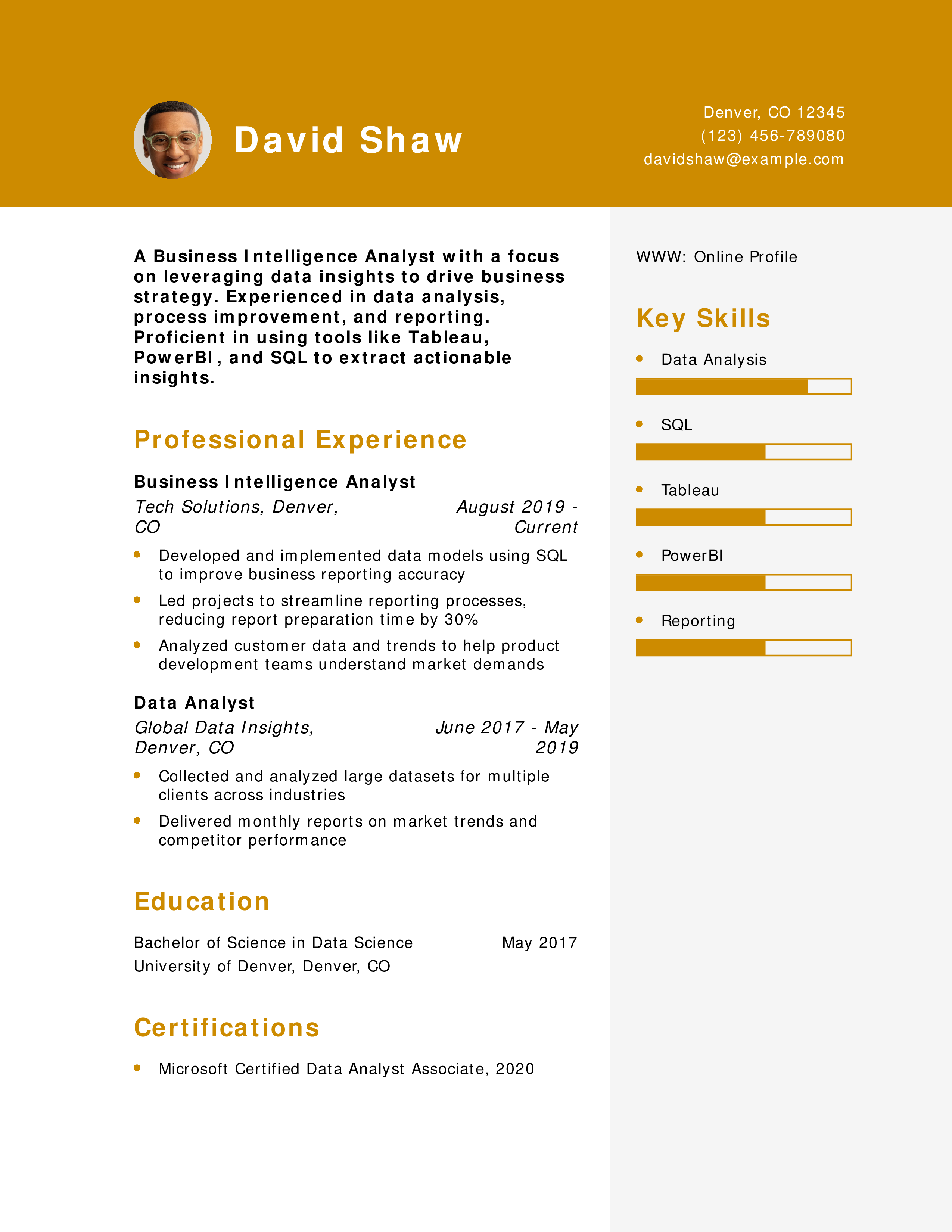
Why this Business Intelligence Analyst resume example is strong:
David’s resume emphasizes his experience in both data analysis and business intelligence reporting. His focus on actionable insights for strategic decision-making sets him apart as a results-driven professional. Explore how to list certifications on a resume here.
Process-Oriented Business Intelligence Analyst Resume Example
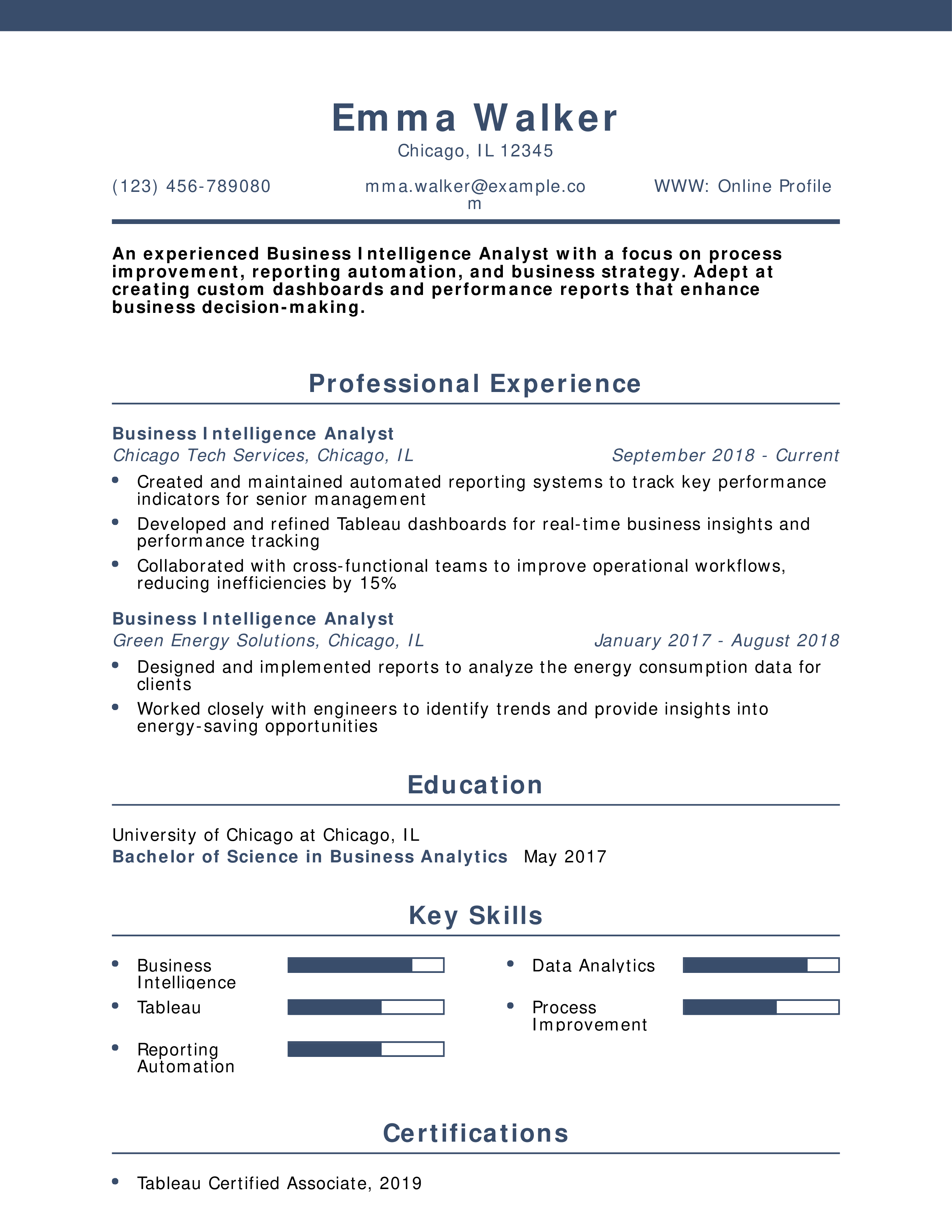
Why this Business Intelligence Analyst resume example is strong:
Emma’s resume highlights her process improvement focus and her ability to automate reporting, which streamlines operations and saves time. Her skills in dashboard development and real-time reporting are invaluable for BI roles. Learn about resume skills here.
Entry-Level Business Intelligence Analyst Resume Example
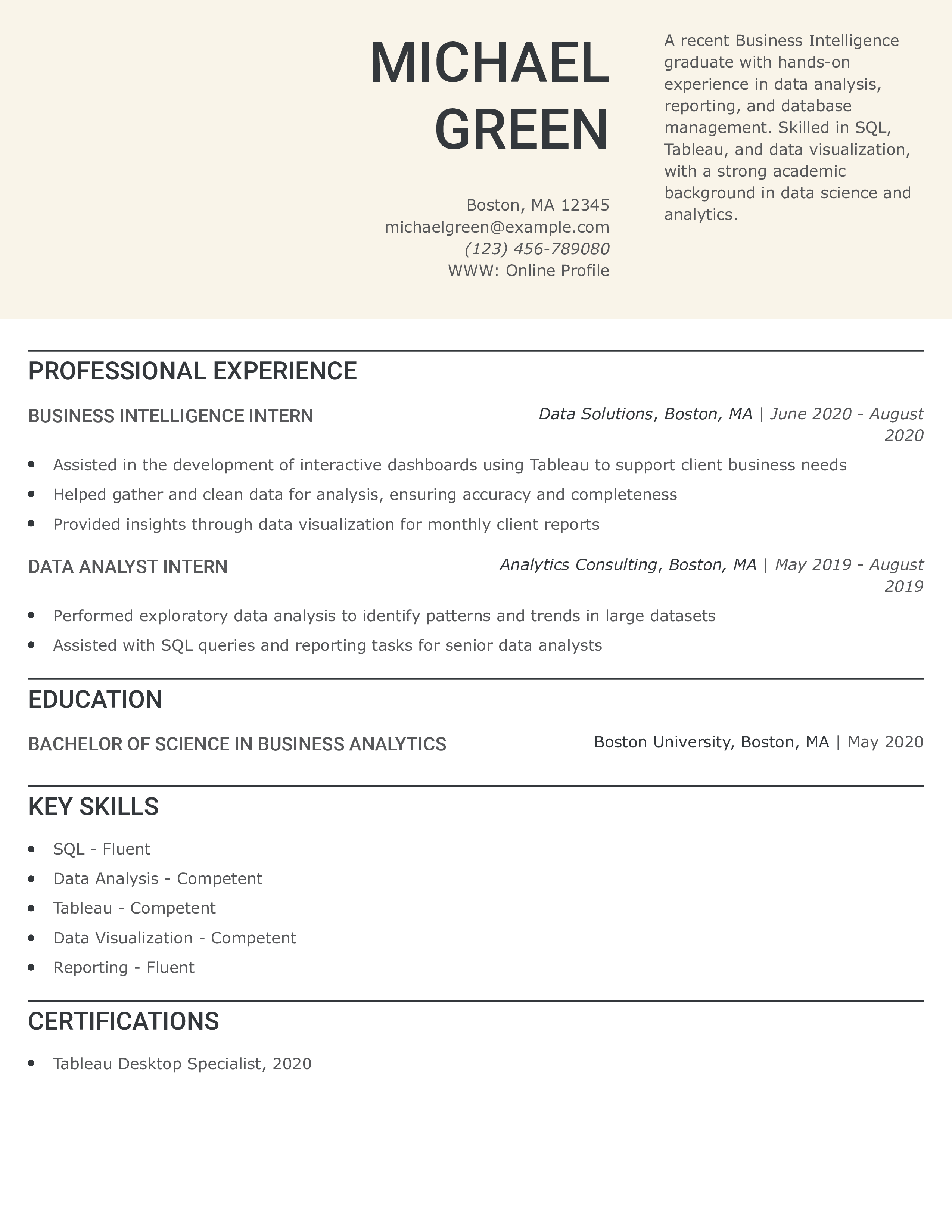
Why this Business Intelligence Analyst resume example is strong:
Michael’s resume demonstrates his ability to support BI teams through hands-on experience, and it’s tailored for entry-level BI roles. His internship experience is leveraged well to show potential for growth. Read about how to list your education on a resume here.
Our templates are crafted by professional resume writers to make creating your resume quick, easy, and effective.
- Professional resume template downloads
- Customized cover letter generation
- AI resume writing support
- Career-building resources and advice
Business Intelligence Analyst Text-Only Resume Templates and Examples
How To Write a Business Intelligence Analyst Resume
1. Write a dynamic profile summarizing your business intelligence analyst qualifications
The first step in the resume-building process is to develop a compelling summary. Choose important facts and stats from your resume to tease in your profile, and wrap them in a narrative that helps the hiring organization understand your value. Detail your job title, years of experience, and three to four specializations that match the job posting. Highlight your proven track record of supporting data-driven decision-making, growing revenue, and reducing costs. Create a snapshot of your career that draws the hiring manager in and entices them to read further.
Senior-Level Profile Example
A senior BI analyst with over 10 years of experience specializing in data governance, business analytics, strategy development, and Agile methodology. A strong history of collaborating with C-level executives to evaluate business metrics and propose change management initiatives. Adept at translating complex data sets into actionable plans.
Entry-Level Profile Example
A BI analyst with entry-level experience specializing in statistical analysis, data analytics, Tableau, and PowerBI. A strong background in analyzing and creating BI reports to drive operational improvements.
2. Showcase your business intelligence analyst experience
Here’s where the BI analyst can truly shine. Feature previous jobs, experience, and achievements with data-backed results. You might note that your data and reporting skills resulted in leadership decisions that drove 50% more productivity or that you identified a bottleneck that was causing $100,000 in unnecessary costs every quarter. Highlight your ability to communicate complex data findings to executive teams and provide examples of you informing high-level business strategies. Keep the reader’s focus on your track record of generating value for teams, clients, and organizations.
Senior-Level Professional Experience Example
Senior Business Intelligence Analyst
Philadelphia Loan Partners, Philadelphia, PA | June 2016 – present
- Perform analysis for senior leadership and C-level executives on business operations, performance, and trends, which includes leading cross-functional teams to execute data analytic projects valued at up to $3 million
- Lead the development of new Tableau dashboards to provide real-time insights into loan and finance products to determine long-term viability
- Gather, analyze, and transform large sets of raw data into business models using SQL, resulting in a process improvement initiative to restructure business lines
Entry-Level Professional Experience Example
Business Intelligence Analyst
Dallas Insurance Group, Dallas, TX | May 2021 – present
- Utilize business analytics to create performance analysis reports and compile data to drive process improvement opportunities
- Develop new dashboards in Tableau to enhance data reporting, which includes gathering key metrics and transforming raw data into actionable insights
- Extract and organize datasets using Excel to create business models and compile data for the organization’s risk index
3. Include business intelligence analyst-related education and certifications
Create additional confidence in your capabilities as a BI analyst by including degrees and certifications on your resume. Common degrees related to the field include a bachelor’s degree in statistics, accounting, business math or administration, or computer science. Seeking certificates can help you stand out from other applicants and may increase your earnings potential. One example is the Certified Business Intelligence Professional (CBIP) certification. Include all relevant certificates on your resume, as some employers may only want to hire those with such credentials.
Education
Template
- [Degree Name]
- [School Name], [City, State Abbreviation] – [Graduation Month and Year]
Example
- Bachelor of Business Administration (B.B.A.)
- University of Dallas, Dallas, TX – May 2021
Certifications
Template
- [Certification Name], [Completion Year]
Example
- Tableau Server Certified Professional, 2021
4. List your business intelligence analyst-related skills and proficiencies
Hiring organizations may use applicant tracking systems (ATS) to automatically sort resumes, and these programs often look for keywords. If certain phrases aren’t present, the ATS may reject your application before it reaches the hiring manager. Including relevant proficiencies and skills also helps convince prospective employers that you’re the ideal candidate. The skills you include on your resume should always match your actual experience, but if you’re not sure what to include, pull out some applicable phrases from the list below to start:
| Key Skills and Proficiencies | |
|---|---|
| Agile methodology | Big data |
| Bloomberg | Business analytics |
| Business modeling | Business strategy |
| Data analysis | Data analytics |
| Data-driven decision making | Data governance |
| Data modeling | Data science |
| Data visualization | MS Excel |
| PowerBI | Project management |
| SAS | Statistical analysis |
| SQL | Tableau |
How To Pick the Best Business Intelligence Analyst Resume Template
A template takes formatting decisions off your plate so you can concentrate on choosing the best data points for your resume. Select a template that shows off your experience and data without too many distracting design flourishes. Options with plenty of scannable bullet points work well for presenting metrics and accomplishments, and an experienced BI analyst may want to choose a template that lists previous jobs in reverse-chronological order.
Frequently Asked Questions: Business Intelligence Analyst Resume Examples and Advice
How do I optimize my Business Intelligence Analyst CV to get noticed by hiring managers?-
To optimize your Business Intelligence Analyst CV, begin by showcasing measurable achievements that demonstrate the value you’ve brought to previous employers. Use action verbs and specific examples to highlight your contributions. Incorporating industry-specific keywords, particularly in the skills and professional experience sections, will help your CV stand out, especially with ATS systems.
What are common action verbs for business intelligence analyst resumes?-
It’s important to demonstrate that you want to participate in the employer’s business actively. Including strong, relevant action verbs in your descriptions of past work and accomplishments helps show hiring managers that you aren’t a passive analyst who simply pulls and passes on numbers. You can start with some example verbs below, but don’t be afraid to get creative if you can think of other relevant verbs to start your bullet points with.
| Action Verbs | |
|---|---|
| Analyzed | Built |
| Conducted | Collaborated |
| Created | Designed |
| Developed | Drove |
| Enhanced | Evaluated |
| Executed | Generated |
| Identified | Implemented |
| Improved | Integrated |
| Led | Managed |
| Performed | Supported |
How do you align your resume with a business intelligence analyst job description?-
As a BI analyst, you know that context is critical. You can’t simply present facts and figures to leadership without providing context for the data so they can make valid decisions. The same is true for your resume. Wrap the details in context by paying attention to job postings. Look for key skills the hiring organization wants and, if relevant, include those on your resume. Provide insights into how you’ve used these skill sets throughout your career.
For example, if a company is seeking a candidate with a strong background in data visualization, you’d provide examples of transforming complex data sets into actionable insights for management teams. If an organization emphasizes business modeling, highlight data analytics projects you worked on to drive revenue growth and help businesses scale.
The Bureau of Labor Statistics notes that analyst opportunities are growing faster than the average for other positions — management analyst job numbers are expected to grow by 11% through 2031, and financial analyst positions are expected to grow by 9% over the same period, just to name two. Aligning your resume with job postings helps you grow your career too.
What is the best business intelligence analyst resume format?-
The reverse chronological format is the optimal choice for BI analysts. This approach emphasizes past professional experience, listing previous positions in order from most recent to oldest. BI analysts with a lot of experience can use this format to demonstrate their tenure in the role and tell a compelling story about their accomplishments.
Functional resume formats should generally be avoided, even at the entry level. Instead of omitting detailed bullet points, move your skills section to the top and provide insights into your academic projects.
What’s the recommended length for a business intelligence analyst resume?-
The recommended length for a business intelligence analyst resume is one page, especially for professionals with under 10 years of experience. A two-page resume can work for those with substantial accomplishments or a longer career, but only if it’s concise and highly relevant to the role. Tailoring your resume to the job and highlighting your strongest qualifications are key to success.
Stick to listing work experience from the last 10 to 15 years, as this period is most relevant to employers. Summarize or omit older positions unless they’re crucial for your application. A focused and streamlined resume will help capture the hiring manager’s attention.
Craft your perfect resume in minutes
Get 2x more interviews with Resume Builder. Access Pro Plan features for a limited time!

